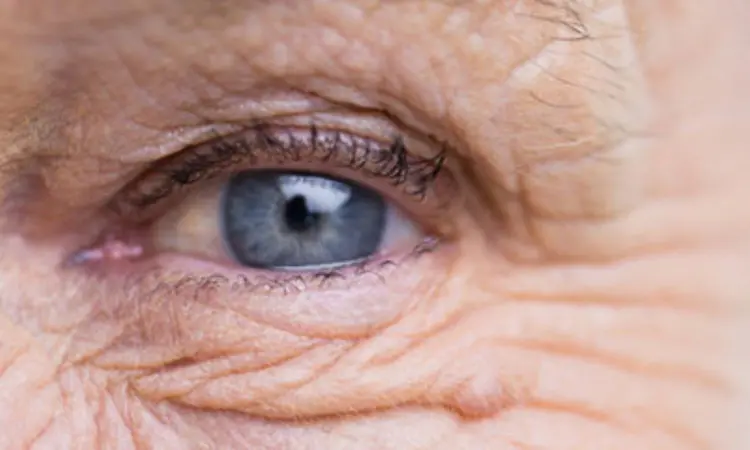- Home
- Medical news & Guidelines
- Anesthesiology
- Cardiology and CTVS
- Critical Care
- Dentistry
- Dermatology
- Diabetes and Endocrinology
- ENT
- Gastroenterology
- Medicine
- Nephrology
- Neurology
- Obstretics-Gynaecology
- Oncology
- Ophthalmology
- Orthopaedics
- Pediatrics-Neonatology
- Psychiatry
- Pulmonology
- Radiology
- Surgery
- Urology
- Laboratory Medicine
- Diet
- Nursing
- Paramedical
- Physiotherapy
- Health news
- Fact Check
- Bone Health Fact Check
- Brain Health Fact Check
- Cancer Related Fact Check
- Child Care Fact Check
- Dental and oral health fact check
- Diabetes and metabolic health fact check
- Diet and Nutrition Fact Check
- Eye and ENT Care Fact Check
- Fitness fact check
- Gut health fact check
- Heart health fact check
- Kidney health fact check
- Medical education fact check
- Men's health fact check
- Respiratory fact check
- Skin and hair care fact check
- Vaccine and Immunization fact check
- Women's health fact check
- AYUSH
- State News
- Andaman and Nicobar Islands
- Andhra Pradesh
- Arunachal Pradesh
- Assam
- Bihar
- Chandigarh
- Chattisgarh
- Dadra and Nagar Haveli
- Daman and Diu
- Delhi
- Goa
- Gujarat
- Haryana
- Himachal Pradesh
- Jammu & Kashmir
- Jharkhand
- Karnataka
- Kerala
- Ladakh
- Lakshadweep
- Madhya Pradesh
- Maharashtra
- Manipur
- Meghalaya
- Mizoram
- Nagaland
- Odisha
- Puducherry
- Punjab
- Rajasthan
- Sikkim
- Tamil Nadu
- Telangana
- Tripura
- Uttar Pradesh
- Uttrakhand
- West Bengal
- Medical Education
- Industry
Low-Dose Aspirin fails to Effectively Prevent Age-Related Macular Degeneration: JAMA

A recent study published in the Journal of American Medical Association found that long-term low-dose aspirin use does not prevent the onset or progression of age-related macular degeneration (AMD) which is a leading cause of irreversible vision loss in the elderly. The ASPREE-AMD study was carried out to determine if daily low-dose aspirin could be an effective intervention against AMD. The recommendations for the participants at risk are generally limited to lifestyle, nutritional and supplement advice. This study explored whether aspirin could offer additional protective effects for vision health.
The ASPREE-AMD study was conducted across multiple centers in Australia as part of the international ASPREE trial examines the broader benefits of aspirin in prolonging disability-free survival among older individuals. The participants aged 70 and above who were free from dementia and significant physical disabilities, cardiovascular diseases or other chronic illnesses limiting five-year survival were included. The retinal images were taken at the start of the study between March 2010 and January 2015, and then again at three and five years post-randomization.
The study involved a total of 4,993 participants with 3,171 having complete data for analysis. The participants were randomly assigned to receive either 100 mg of enteric-coated aspirin daily or a placebo. The primary outcomes measured were the incidence of AMD and the progression from early or intermediate to late-stage AMD.
The results indicated no significant difference in AMD incidence between the aspirin and placebo groups. AMD developed in 19.4% of participants in the aspirin group when compared to 19.1% in the placebo group this also yielded a relative risk (RR) of 1.02 (95% CI, 0.85-1.22; P = .86). Also, the progression to late-stage AMD was observed in 2.3% of the aspirin group and 3.1% of the placebo group (RR, 0.72; 95% CI, 0.36-1.44; P = .36), suggesting a trend but not a statistically significant reduction in the progression.
The study concluded that low-dose aspirin that was taken over an average follow-up period of 3.1 years did not significantly impact the incidence or progression of AMD. The research also noted that while there was a slight indication of reduced progression to late-stage AMD in the aspirin group, the evidence was not strong enough due to the low number of cases observed.
Source:
Robman, L. D., Wolfe, R., Woods, R. L., Thao, L. T. P., Makeyeva, G. A., Hodgson, L. A. B., Lepham, Y.-A., Jachno, K., Phung, J., Maguire, E., Luong, H., Trevaks, R. E., Ward, S. A., Fitzgerald, S. M., Orchard, S. G., Lacaze, P., Storey, E., Abhayaratna, W. P., Nelson, M. R., … McNeil, J. J. (2024). Effect of Low-Dose Aspirin on the Course of Age-Related Macular Degeneration. In JAMA Ophthalmology. study's (AMA). https://doi.org/10.1001/jamaophthalmol.2024.1584
Neuroscience Masters graduate
Jacinthlyn Sylvia, a Neuroscience Master's graduate from Chennai has worked extensively in deciphering the neurobiology of cognition and motor control in aging. She also has spread-out exposure to Neurosurgery from her Bachelor’s. She is currently involved in active Neuro-Oncology research. She is an upcoming neuroscientist with a fiery passion for writing. Her news cover at Medical Dialogues feature recent discoveries and updates from the healthcare and biomedical research fields. She can be reached at editorial@medicaldialogues.in
Dr Kamal Kant Kohli-MBBS, DTCD- a chest specialist with more than 30 years of practice and a flair for writing clinical articles, Dr Kamal Kant Kohli joined Medical Dialogues as a Chief Editor of Medical News. Besides writing articles, as an editor, he proofreads and verifies all the medical content published on Medical Dialogues including those coming from journals, studies,medical conferences,guidelines etc. Email: drkohli@medicaldialogues.in. Contact no. 011-43720751


